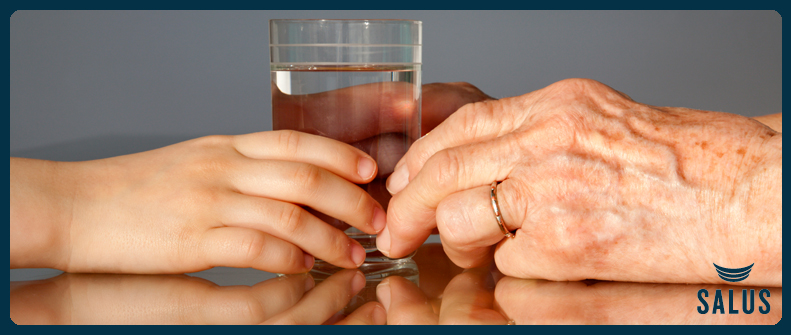
The risk of dehydration is real for senior citizens in Grenada Hills. This condition occurs when the body loses more water than it takes in. It can result from poor dietary choices, medications and even some health concerns that are common among the elderly. While some might view this problem as an easy one to fix, many seniors are unable to manage it, and the end result can be dire consequences including hypernatremia, confusion, urinary tract infections and even death.
Dehydration and Granada Hills Seniors in Nursing Homes
Dehydration is especially prevalent in nursing homes. A recent research study reported in the Journal of the Royal Society of Medicine reviewed data on more than 21,000 hospital patients over the age of 65. Among these individuals, many were admitted with high sodium levels, a condition caused by dehydration, and nursing home residents were more than five times as likely to have this condition. While the reasons for this increase were not mentioned in the report, contributing factors could include low staff to patient ratio and less individualized attention for seniors. Dehydration can also happen quickly when seniors experience diarrhea or a fever, and some nursing home staff are not aware of how high these risks are or what to watch for.
Homebound Seniors in San Fernando
While nursing home residents are most at risk, Granada Hills homebound seniors also suffer from dehydration. These individuals are prone to depression, and this sometimes causes them to forget to drink enough water throughout the day. Additionally, the frailest seniors have been diagnosed with heart conditions, diabetes or other health concerns and take a significant number of medications on a daily basis. While beneficial in many ways, these medications sometimes inhibit thirst, act as diuretics or in other ways increase the individual’s vulnerability to dehydration.
Preventing Dehydration
To prevent dehydration, elderly people in San Fernando and Grenada Hills need to be encouraged to drink enough and, more importantly, provided with the support that they need in order to consume fluids. This support might be as simple as keeping a glass of water next to the bedside, providing a straw or offering regular reminders. Sometimes seniors need physical assistance with holding a glass due to arthritis, weakness or later stage dementia. Seniors with incontinence benefit from support getting to the bathroom and reassurance that someone will be there to help them ambulate to the restroom or change their undergarments to keep them clean and dry. When they are not, some fail to drink enough as the result of fears that they may wet themselves and have to sit in urine-soaked undergarments for an extended period of time.
Signs to Watch For
Caregivers should carefully watch for warning signs other than thirst, a late indicator of dehydration. These might include significant weight loss, fatigue, dark colored urine, infrequent urination, low blood pressure, dry mouth or the inability to function normally. Medical attention is warranted if these signs are noted on a regular basis.
Dehydration is a problem that Granada Hills family caregivers must take seriously. If your loved one is in a nursing home, visit frequently to monitor for any concerns. If your loved one is homebound, contact Salus Homecare San Fernando for assistance. Our in-home aides and in-home healthcare workers are trained to recognize the signs of dehydration and take actions to prevent it. They provide the extra level of support that helps to keep your loved one safely and comfortably aging in place. To learn more, call and arrange your free, no obligation consultation.
There is no ads to display, Please add some

